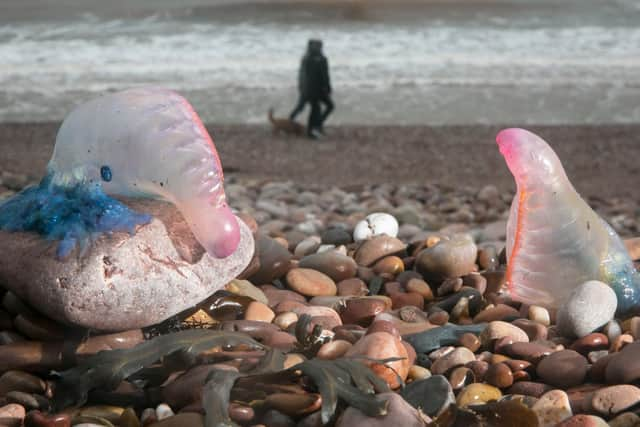Portuguese Man o’ war found on West Sussex beach - But what is the 'Floating Terror' and why is it so dangerous?
This article contains affiliate links. We may earn a small commission on items purchased through this article, but that does not affect our editorial judgement.
and live on Freeview channel 276
Portuguese Man o’ war, also known as the 'Floating Terror', have been seen on the beach at Climping, Arun District Council said.
What is a Portuguese Man o’ war?
According to the National Geographic, a Portuguese man-of-war is a colony of individual organisms called polyps.They are jellyfish-like creatures.
Advertisement
Hide AdAdvertisement
Hide AdAnyone unfamiliar with the biology of the venomous Portuguese man-of-war would 'likely mistake it for a jellyfish', experts said.
A National Geographic profile read: “They are covered in venom-filled nematocysts used to paralyze and kill fish and other small creatures.
"For humans, a man-of-war sting is excruciatingly painful, but rarely deadly. But beware — even dead man-of-wars washed up on shore can deliver a sting.”
Experts said the Portuguese Man o’ war comprises four separate polyps and gets its name from the uppermost polyp, a gas-filled bladder, or pneumatophore, which sits above the water and 'somewhat resembles an old warship at full sail'. They are also known as bluebottles for the purple-blue color of their pneumatophores.


Advertisement
Hide AdAdvertisement
Hide AdThey are found, sometimes in groups of 1,000 or more, floating in warm waters throughout the world’s oceans.
The profile added: "They have no independent means of propulsion and either drift on the currents or catch the wind with their pneumatophores. To avoid threats on the surface, they can deflate their air bags and briefly submerge."
What has the local council said?
"Please be cautious when walking on the beach," Arun District Council warned on social media after the sighting.
"Do not touch them and keep dogs on leads.
"The sting from a Portuguese Man o’ war can be very painful and if ingested by a dog can be toxic and in some cases fatal."
Advertisement
Hide AdAdvertisement
Hide Ad